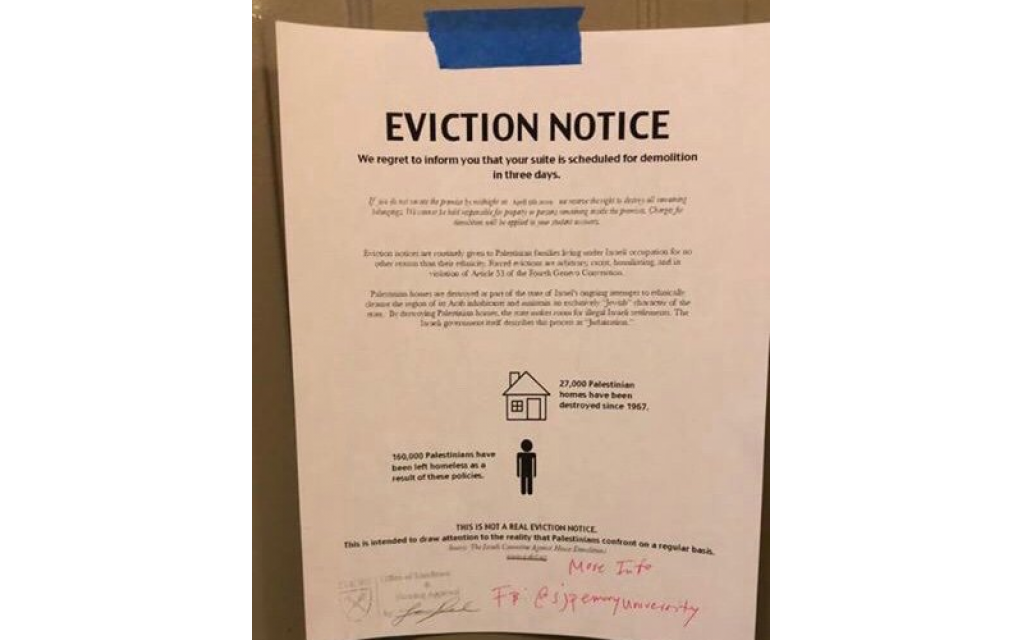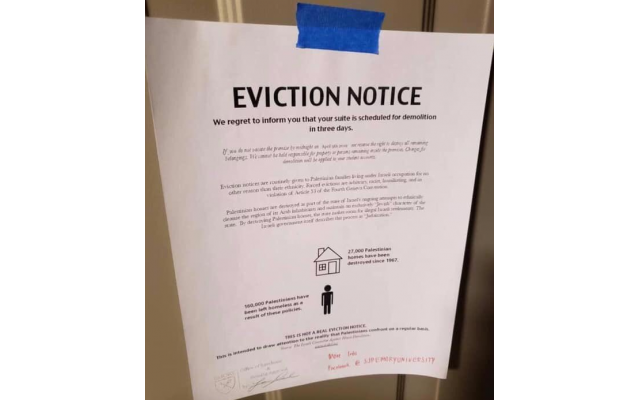Emory University Caught in Israel-Palestinian Flap
Jewish Atlanta reacts as the facts of Emory's campus turmoil surface.
Dave Schechter is a veteran journalist whose career includes writing and producing reports from Israel and elsewhere in the Middle East.
Middle East politics are roiling the Emory University campus after fake “eviction notice” flyers were placed on doors of dormitories and off-campus apartments, as part of an annual pro-Palestinian student protest.
According to various sources, the flyers were posted on the dormitory doors of Jewish and non-Jewish students. Flyers also were posted at the off-campus Emory Point apartments.
The flyers, which appeared on April 2, had been approved by a university office, Emory Residence Life, which later ordered them removed because they violated a policy against posting flyers on the doors without student consent.
“I find it racist, anti-Semitic and absolutely offensive,” said Rabbi Russ Shulkes, executive director of Hillels of Georgia, told WSB-TV. Shulkes described the reactions he received from students as ranging “from anger to fear to security issues to how could Emory allow this to take place?”
An estimated 17 percent of Emory’s undergraduate students and 10 percent of its graduate students are Jewish, according to the Hillel International website.
“In reviewing this incident, we found no evidence that individual students or a particular group were targeted,” the university said in a statement issued April 3.

The official-looking notices, which stated that the dormitory would be demolished in three days, were posted by Emory Students for Justice in Palestine, as part of Israeli Apartheid Week.
The flyers read: “Palestinian homes are destroyed as part of the state of Israel’s ongoing attempts to ethnically cleanse the region of its Arab inhabitants and maintain an exclusively ‘Jewish’ character of the state.” A disclaimer at the bottom of the flyer advised that the warning was not real.
Similar flyers have been posted on other campuses in recent years.
The annual anti-Israel event was taking place the same days as Emory Israel Week, sponsored by Emory Eagles for Israel.
A statement was sent campuswide April 2 on behalf of Paul Marthers, Emory’s interim vice president for Campus Life and vice provost for enrollment management. It said that, “While we want to create an environment where the free expression of ideas and open, vigorous debate and speech are valued, we must also recognize that the manner in which we communicate can have consequences. In this case, Campus Life is investigating the incident and has engaged with students who created the flyers. While the flyers have been removed from unapproved areas, it does not erase their impact. My hope is we can learn from this incident to bring together in meaningful conversation the many points of view that are needed to advance our understanding of complex issues in the world,” Marthers said.
Dave Cohn, the director of Emory Hillel, issued a letter to students, parents and alumni on April 2, outlining Hillel’s response. “While we support the right of every student in our community to express themselves freely, foremost in our response has been defending the safety of our students from this intrusion on their privacy and security.” The university’s response was criticized by professor Kenneth W. Stein, director of the Emory Institute for the Study of Modern Israel and president of the Center for Israel Education. In an email to the AJT, Stein said that Marthers’ statement “was full of process but shallow on substance.”

“A university administrator stamped approval and by doing so sanctioned the content of the ‘eviction’ notice. There is no wiggle room for the university’s bad judgment; it was bad judgment. Period. It is clear that the person, persons, or committee that approved the posting did not realize or understand the anti-Semitic contents of the flyer. … It is hoped that the university letter is the first response and not its final statement on this matter. In the parlance of Passover, “it is not sufficient.” It is not at all close to dayenu,” Stein said.
Sophia Weinstein, president of the Emory-Israel Public Affairs Committee, told the AJT that she talked with Michael Elliott, dean of the Emory College of Arts and Sciences, about scheduling a meeting between university officials and representatives of several campus Jewish groups.
Emory’s handling of the situation also has been criticized outside of the university.

Allison Padilla-Goodman, Southeast regional director of the Anti-Defamation League, sent a letter April 4 to Emory University president Claire E. Sterk.
“The anti-Israel activists who passed out these notices are creating tension, intimidating and isolating students, and fostering a hostile atmosphere on campus. The academic environment should be a place where constructive dialogue and discourse about the Israeli-Palestinian conflict can thrive, not a place where perspectives regarding the conflict infringe on students’ personal space, the ADL letter said.
Check back soon for more updates on this developing story. To read the extended version of this report, click here.
- News
- Breaking News
- Anti-Semitism
- politics
- Middle East
- Emory Eviction Notice
- Sophia Weinstein
- Michael Elliott
- Anti-Defamation League
- Dave Cohn
- Paul Marthers
- Anti-Israel
- Anti-Zionism
- Rabbi Russ Shulkes
- Hillels of Georgia
- Ken Stein
- Emory Institute for the Study of Modern Israel
- Allison Padilla-Goodman
- Dave Schechter
- Emory University Hillel
- Emory University




comments